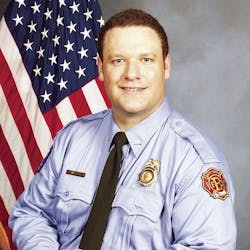TX City Suing Firefighter Battling Cancer
July 14--A firefighter battling cancer is being sued by the City of Baytown in order to deny paying him insurance coverage for his treatment over the last 18 months.
Patrick Mahoney, a battalion chief for the Baytown Fire Department, was diagnosed with thyroid cancer in December 2016, forcing him to have half of his thyroid removed and undergo continued treatment, including thyroid hormone supplements and regular blood work.
Immediately after his diagnosis, Mahoney, 36, filed a workers compensation claim, seeking insurance coverage for his treatment, which he is currently paying out of pocket. Mahoney believes he was exposed to carcinogens as part of the hazards of his work as a firefighter, and Chapter 607 of the Texas Government Code, known as the "presumptive statute," ensures treatment of job-related illnesses.
"The law is on our side with that," Mahoney said in a phone interview. "It's impossible to trace something directly, that's why we have the presumptive law because (firefighters) are exposed to so many different things on such a regular basis, it's impossible to trace it to any one thing. But I'm a longtime non-tobacco user, it's a reasonable belief, I think."
Mahoney prevailed in the initial benefit review conference with the TML Intergovernmental Risk Pool, the city's workers compensation administrator, and also won on appeal. After the appeal victory, the city decided to sue Mahoney in May in order to deny Mahoney's claim, retaining an outside counsel, attorney Brandi Prejean of the San Antonio-based law firm Thornton Biechlin Reynolds & Guerra.
"(The city has) spent a tremendous amount of money fighting this, probably more than they would have paid if they had just paid the claim in the first place," Mahoney said.
Prejean said in a statement Friday that the city has the right to appeal the decision.
"The City of Baytown has paid all of the benefits they were ordered by the state agency to pay to Mr. Mahoney and continue to do so. The state agency charged with addressing these types of disputes has taken inconsistent positions on the types of cancer covered under the applicable law. The City has the right to appeal the state agency's decision to District Court. The City has chosen to exercise that right and Mr. Mahoney continues to be afforded all benefits he is due, pending the outcome of the City's appeal," the statement said.
Mahoney, a member of the Baytown Fire Department since 2002, characterized the city's lawsuit and ongoing litigation of his claims actions as a "betrayal" and a "slap in the face," and believes that the city is attempting to avoid setting a precedent of paying out insurance claims to firefighters who are increasingly at risk of cancer.
"We've had several firefighters with cancer in the Baytown Fire Department," Mahoney said. "So I suspect they want to fight tooth and nail to avoid setting the precedent that they're going to accept any of these claims."
John Riddle, the president of Texas State Association of Fire Fighters, the union representing all firefighters across the state, sent a letter in May to Baytown Mayor Stephen DonCarlos and City Manager Rick Davis urging them to drop the lawsuit. Riddle cited an International Agency for Research on Cancer study that found higher risks of thyroid and other cancers for firefighters.
"As a Baytown firefighter, Mr. Mahoney is at increased risk for developing thyroid cancer and numerous other illnesses caused by repeated exposure to hazardous materials," Riddle wrote. "We urge you to immediately reverse course and ensure Mr. Mahoney that he will receive the insurance benefits promised to him."
Mahoney's health insurance through the city does not cover cancer treatment.
Two recent studies commissioned by the National Institute for Occupational Safety and Health concluded that firefighters face a 9 percent increase in cancer diagnoses, and a 14 percent increase in cancer-related deaths, compared to the general U.S. population.
This concern for the safety of firefighters led President Donald Trump to sign on July 9 the Firefighter Cancer Registry Act, which calls for the collection of voluntary data including whether a firefighter is a career professional or volunteer, years on the job, the number of calls responded to, and incident type so that researchers can better understand the impact of smoke inhalation and other job-related dangers that may lead to cancer.
Dallas Webb, president of the Baytown Professional Firefighters, IAFF Local 1173, the union representing Mahoney and his firefightercolleagues, said if a district court rules in the city's favor, Mahoney would be on the hook for not only the initial workers compensation claims, but all of his cancer treatments since his diagnosis, potentially costing him hundreds of thousands of dollars out of pocket.
Webb said there have been a spate of cancer diagnoses among his membership and that one firefighter passed away from stomach cancer in 2016.
"When you have five [cancer] cases in the last three years, especially when you've had one of our members die from stomach cancer, it's very disheartening that the city would even take this approach," Webb said.
Mahoney, who continues to work as a firefighter despite the lawsuit, said the ongoing litigation has weighed heavily on him and his wife. He worries about retribution if the city is forced to pay his claims, but that concern is nothing compared to the fear he has for his colleagues that the hazards of their job will lead to similar illnesses.
"It makes me wary, especially because I'm in a higher supervisory role, it makes me very cautious for the people below me, to make sure that they're taking the necessary precautions, doing all we can to make sure we clean our gear, shower right away, clean our equipment," Mahoney said. "It makes you a lot more cognizant of what you can do."
___ (c)2018 the Houston Chronicle Visit the Houston Chronicle at www.chron.com Distributed by Tribune Content Agency, LLC.
